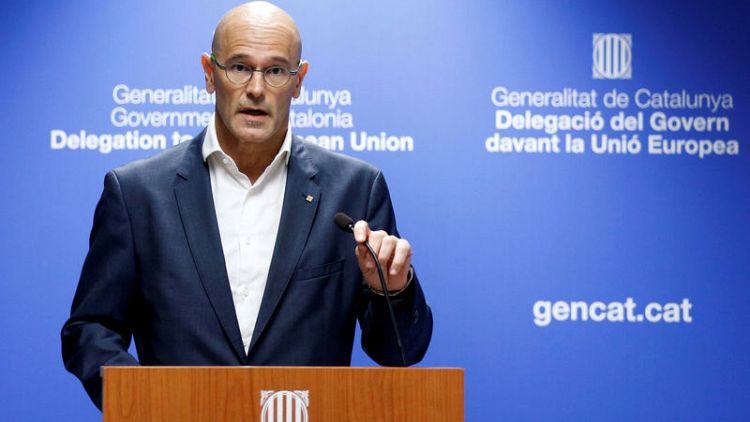By Joan Faus
BARCELONA, Spain (Reuters) - Jailed Catalan politician Raul Romeva hopes the upcoming trial of separtist leaders at the Supreme Court in Madrid will refocus attention on the region's push for independence from Spain.
The trial of Romeva and 11 others should start next Thursday or on Feb. 12. He was one of nine jailed without bail in late 2017 and early 2018 who were transferred on Friday from prisons outside Barcelona to facilities near Madrid.
Spain's public prosecutor is seeking prison terms of up to 25 years for them on charges of rebellion and misuse of public funds for their role in Catalonia's failed secession bid from Spain in 2017.
"We've sought to be heard for a long while, but they silenced our voices and image with jail," Romeva, 47, told Reuters in an interview conducted in a written question and answer format just before the transfer to Madrid.
"We see the trial as an opportunity to address public opinion and society in Catalonia, Spain and obviously at an international level," he wrote.
He and his co-defendants are accused of "crimes that European courts deny and that we have not committed," he said.
"That is why the only possible sentence is acquittal. A (condemnation) sentence will always weigh on history and on Spain's future."
Romeva was in charge of foreign relations in the regional government led by Carles Puigdemont in 2017 when Catalonia unilaterally proclaimed independence after a referendum that was deemed unconstitutional by Madrid.
Before that, he led a coalition of pro-independence parties in the 2015 Catalan elections and was also a member of the European Parliament.
The events brought Spain to one of its worst political crises since the end of the Franco dictatorship and the return of democracy four decades ago. The central government briefly took direct control of the region and rounded up prominent separatist leaders.
Romeva said he respected the decision by Puigdemont and some of his former government colleagues to flee Spain to avoid arrest. Puigdemont is living in self-imposed exile in Belgium.
Spanish Prime Minister Pedro Sanchez, a socialist who came to power last June and needs the support of Catalan nationalists to pass laws, favours the path of dialogue to give Catalonia more autonomy but has ruled out any moves towards independence.
Romeva urged Sanchez to be brave in addressing the issue and make a viable offer to the Catalan parties if he wants their support to his budget proposal facing its first vote next month.
He does not regret Catalan government actions and said that Spain would eventually have to come to terms with reality.
"Holding a referendum is not a crime. ..Denying reality will never fix anything," he said. "We've always sought and offered dialogue, and the answer has always been denial and repression," he said.
(Editing by Andrei Khalip and Angus MacSwan)
